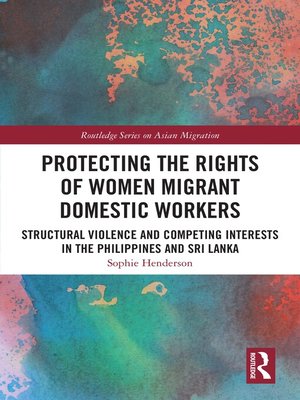Protecting the Rights of Women Migrant Domestic Workers
ebook ∣ Structural Violence and Competing Interests in the Philippines and Sri Lanka · Routledge Series on Asian Migration
By Sophie Henderson

Sign up to save your library
With an OverDrive account, you can save your favorite libraries for at-a-glance information about availability. Find out more about OverDrive accounts.
Find this title in Libby, the library reading app by OverDrive.



Search for a digital library with this title
Title found at these libraries:
| Library Name | Distance |
|---|---|
| Loading... |
Migrant women across Asia disproportionately work in precarious, insecure, and informal employment sectors that are subject to few regulations, pay low wages, and expose women to harm, of which domestic work is among the most prevalent. This book uses the cases of the Philippines and Sri Lanka to develop a comprehensive, intersectional, rights-based approach to better protect women migrant domestic workers against exploitation.
As accounts of exploitation, gender-based violence, torture, and death among migrant domestic workers increase, the recognition and defence of their human and labour rights is an urgent necessity. The Philippines and Sri Lanka are two of the leading labour-sending states of women domestic workers in Asia, and their economies have become increasingly dependent on the remittances they send back home. Drawing on extensive original research this book argues that these two sending states are guilty of structural violence by sustaining a network of institutions, policies and practices, which serve to systematically disadvantage and discriminate against women migrant domestic workers. The research covers the entire migration process, from pre-departure, through to overseas employment, followed by return and reintegration.
This book's innovative application of structural violence theory as a way to investigate the role of state institutions in labour-sending countries in the Global South will be of interest to researchers from across the fields of migration studies, gender studies, human rights law, and Asian Studies.







